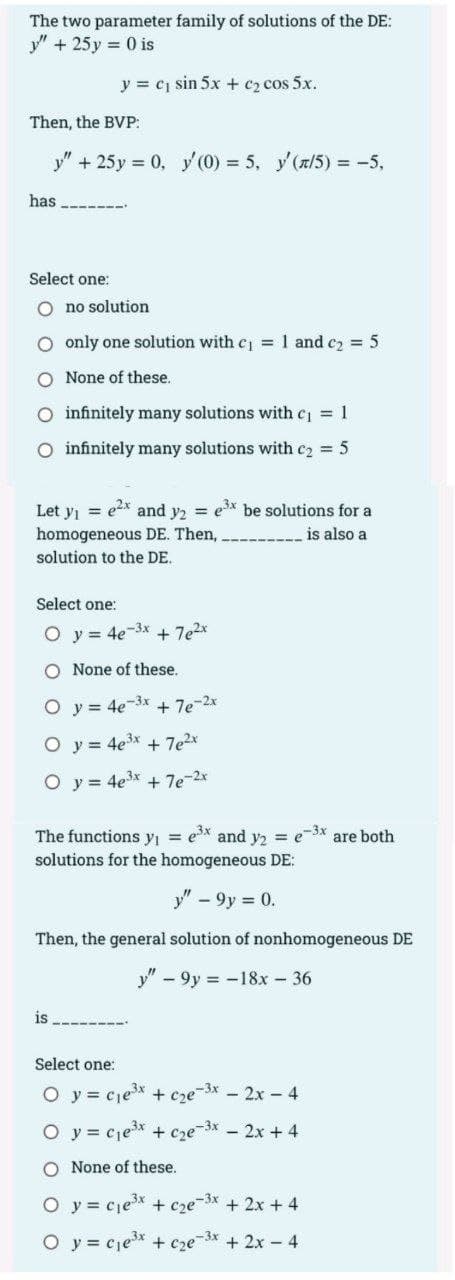Calculus: Early Transcendentals
8th Edition
ISBN:9781285741550
Author:James Stewart
Publisher:James Stewart
Chapter1: Functions And Models
Section: Chapter Questions
Problem 1RCC: (a) What is a function? What are its domain and range? (b) What is the graph of a function? (c) How...
Related questions
Question

Transcribed Image Text:The two parameter family of solutions of the DE:
y" + 25 y = 0 is
y = c sin 5x + c2 cos 5x.
Then, the BVP:
y" + 25y 0, y (0) = 5, y'(x/5) = -5,
has
Select one:
O no solution
O only one solution with cj = 1 and cz = 5
O None of these.
O infinitely many solutions with cj = 1
O infinitely many solutions with c2 = 5
Let y = ex and y, = ex be solutions for a
homogeneous DE. Then,
is also a
solution to the DE.
Select one:
O y = 4e-3x + 7e2x
O None of these.
O y = 4e-3x
+ 7e-2x
O y = 4e3x
+ 7e2x
O y = 4e3x + 7e-2x
The functions yı = ex and y2 = e3x are both
solutions for the homogeneous DE:
y" - 9y = 0.
Then, the general solution of nonhomogeneous DE
y" - 9y = -18x - 36
is
Select one:
O y = cjex + cze-3x - 2x – 4
O y = cje* + cze-3x - 2x + 4
O None of these.
O y = cjex + cze3x + 2x + 4
O y = cje* + cze-3x + 2x - 4
Expert Solution
This question has been solved!
Explore an expertly crafted, step-by-step solution for a thorough understanding of key concepts.
This is a popular solution!
Trending now
This is a popular solution!
Step by step
Solved in 3 steps with 3 images

Recommended textbooks for you

Calculus: Early Transcendentals
Calculus
ISBN:
9781285741550
Author:
James Stewart
Publisher:
Cengage Learning

Thomas' Calculus (14th Edition)
Calculus
ISBN:
9780134438986
Author:
Joel R. Hass, Christopher E. Heil, Maurice D. Weir
Publisher:
PEARSON

Calculus: Early Transcendentals (3rd Edition)
Calculus
ISBN:
9780134763644
Author:
William L. Briggs, Lyle Cochran, Bernard Gillett, Eric Schulz
Publisher:
PEARSON

Calculus: Early Transcendentals
Calculus
ISBN:
9781285741550
Author:
James Stewart
Publisher:
Cengage Learning

Thomas' Calculus (14th Edition)
Calculus
ISBN:
9780134438986
Author:
Joel R. Hass, Christopher E. Heil, Maurice D. Weir
Publisher:
PEARSON

Calculus: Early Transcendentals (3rd Edition)
Calculus
ISBN:
9780134763644
Author:
William L. Briggs, Lyle Cochran, Bernard Gillett, Eric Schulz
Publisher:
PEARSON

Calculus: Early Transcendentals
Calculus
ISBN:
9781319050740
Author:
Jon Rogawski, Colin Adams, Robert Franzosa
Publisher:
W. H. Freeman


Calculus: Early Transcendental Functions
Calculus
ISBN:
9781337552516
Author:
Ron Larson, Bruce H. Edwards
Publisher:
Cengage Learning